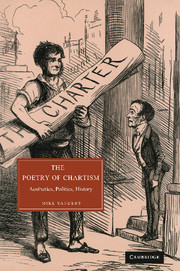Book contents
- Frontmatter
- Contents
- Acknowledgements
- CAMBRIDGE STUDIES IN NINETEENTH-CENTURY LITERATURE AND CULTURE
- Introduction
- 1 The Chartist imaginary: ‘talking by turns of politics and poetry’
- 2 Chartist poetry and literary history
- 3 ‘A jackass load of poetry’: the Northern Star's poetry column 1838–1852
- 4 Insurrectionary sonnets: the ideological afterlife of the Newport uprising
- 5 ‘Merry England’: memory and nostalgia in the year of the mass strike
- 6 ‘The future-hastening storm’: Chartist poetry in 1848
- 7 Constellating Chartist poetry: Gerald Massey, Walter Benjamin and the uses of messianism
- Appendix A Three Chartist poems
- Appendix B Details of poetry published in the poetry column of the Northern Star
- Bibliography
- Index
5 - ‘Merry England’: memory and nostalgia in the year of the mass strike
Published online by Cambridge University Press: 11 July 2009
- Frontmatter
- Contents
- Acknowledgements
- CAMBRIDGE STUDIES IN NINETEENTH-CENTURY LITERATURE AND CULTURE
- Introduction
- 1 The Chartist imaginary: ‘talking by turns of politics and poetry’
- 2 Chartist poetry and literary history
- 3 ‘A jackass load of poetry’: the Northern Star's poetry column 1838–1852
- 4 Insurrectionary sonnets: the ideological afterlife of the Newport uprising
- 5 ‘Merry England’: memory and nostalgia in the year of the mass strike
- 6 ‘The future-hastening storm’: Chartist poetry in 1848
- 7 Constellating Chartist poetry: Gerald Massey, Walter Benjamin and the uses of messianism
- Appendix A Three Chartist poems
- Appendix B Details of poetry published in the poetry column of the Northern Star
- Bibliography
- Index
Summary
Once thou wert ‘Merry England’, and thy fruitful soil was blest; Thy daughters then knew happiness, and thy sons had food and rest
Anon, ‘Merry England’In the aftermath of Newport, the government arrested and imprisoned nearly 500 Chartists including many of the movement's national leaders. William Lovett and John Collins were imprisoned in Warwick jail, Peter Murray McDouall and Bronterre O'Brien languished in the castles of Chester and Lancaster, respectively, whilst Feargus O'Connor was confined in York castle. The government proclaimed that it had extinguished ‘the chimera of Chartism’, and paid little attention to Thomas Carlyle's warning that its ‘living essence’ remained a potent force in the body politic.
The accuracy of Carlyle's prediction was soon demonstrated. In July 1840 the National Charter Association (NCA) was founded at a conference held in Manchester. The steady release of national leaders between July 1840 and August 1841 gave renewed impetus to the movement nationally as well as permitting great ceremonial displays of revived Chartist strength as localities organised elaborate demonstrations to hail the liberation of their leaders. By October 1841 the NCA had begun to organise a second petition, and by May 1842 the collective efforts of some 400 localities and 50,000 individual members had collected 3,317,752 signatures. The petition was presented by T. S. Duncombe to the House of Commons on 2nd May and, after a debate, was rejected by 287 votes to 49.
- Type
- Chapter
- Information
- The Poetry of ChartismAesthetics, Politics, History, pp. 129 - 165Publisher: Cambridge University PressPrint publication year: 2009



